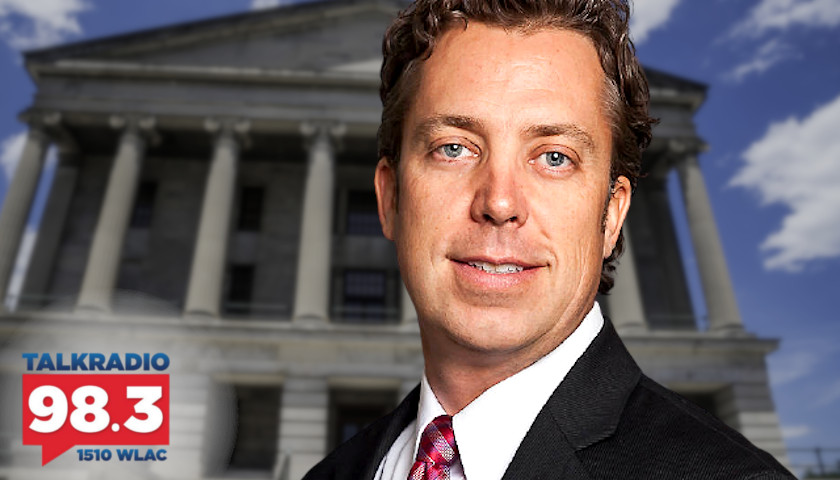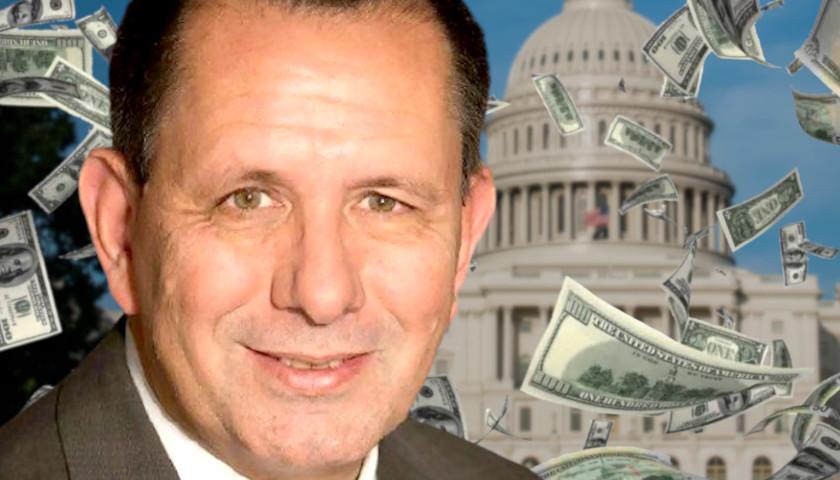Live from Music Row Tuesday morning on The Tennessee Star Report with Michael Patrick Leahy – broadcast on Nashville’s Talk Radio 98.3 and 1510 WLAC weekdays from 5:00 a.m. to 8:00 a.m. – host Leahy welcomed Maury County Mayor Andy Ogles in the studio who reviewed the Tennessee Constitution by articulating the specific guard rails of which the governor may exercise emergency powers.
Leahy: We are having an anti-lockdown party with California Refugee Mark Pulliam in the studio and Maury County Mayor Andy Ogles in the studio. Andy, you were talking a little bit about what emergency powers the governor of Tennessee really has under the Constitution and we were talking about the language of the Constitution. I wonder if you could read what the Constitution says again about those powers.
Ogles: Yeah. So before we get to the Emergency Powers Act, Article 7 Section 1 Tennessee’s Constitution states and this paragraph is talking about your constitutional officers. I as the county mayor the CEO of Maury County, I am the chief constitutional officer for the county.
And it says, “Their qualifications and duties shall be prescribed by the General Assembly.”
Period. And that’s it.
There’s a period.
And Mark Pulliam, you’re an attorney you can talk about the importance of where the period are where the comma is in a sentence. But if you any question or doubt as to who has domain over your constitutional officers in the counties the next sentence, the last sentence of the paragraph states any officer shall be removed from malfeasance or neglect of duty as prescribed by the General Assembly.
Period.
Leahy: Another period not a comma. Not a “but,” not an “and,” and not an “if.”
Ogles: The governor has the powers or it’s the voters during an election or it’s the general assembly. Period. That’s who gives me or takes authority as county mayor. Now when you go to 58 – 2107 that’s the Emergency Powers Act. It states very clearly that an executive order as prescribed by the governor has an effect of the law period. It just says it and it says such executive orders proclamations and rules have the force and effect of law. However, under 58 – 2107 there’s some caveats.
And they are lettered and numbered. And when you get down to H, it talks about those dang constitutional officers again. I’m a subdivision of the state of Tennessee. And it says the governor can delegate new authority to me. And again the words matter. And again Mark you’re an attorney so you can speak to this. But prior to an emergency or threat of an emergency. In other words before. I can’t be given a new authority during a state of emergency.
Why? Because the General Assembly has the final say. And so one would presume that under a state of an emergency your General Assembly could not meet and could not affect their duties there go any new authority granted to me must fall under their domain, not during a time where the governor has assumed total authority. And so it’s nuanced. It’s nerdy. It’s convoluted. I get it. But it is in black and white. And if you take the time to read it, you’re like, holy crap.
Leahy: So how then does the governor have the legal authority to give county mayors the right to determine whether or not masks will be mandated or not.
Ogles: He doesn’t.
Leahy: I don’t think he does either.
Ogles: A mask is by definition by our federal government is now considered a medical device. As a county mayor have no authority under the law of the state of Tennessee to prescribe a medical device.
Leahy: We have to now turn to counselor Mark Pulliam. What’s your take on that? You spent 30 years as an attorney in California. What’s your take on that?
Pulliam: Well, we have constitutions for a reason. They are the rule book of how elected officials interact with each other, what powers they have, and which powers they don’t have. And we have to take these rules seriously because if we don’t take them seriously, then elected officials can do whatever they want.
And a lot of people and this was probably the worst thing that came out of this COVID crisis is people sort of saying well, this is different. This is an emergency. We don’t really have to pay attention to the rules. Well, it’s exactly when you have a so-called emergency that the rule book becomes especially important because in normal times we can trust the government. But not an emergency.
Listen to the full second hour here:
– – –
Tune in weekdays from 5:00 – 8:00 a.m. to the Tennessee Star Report with Michael Patrick Leahy on Talk Radio 98.3 FM WLAC 1510. Listen online at iHeart Radio.




